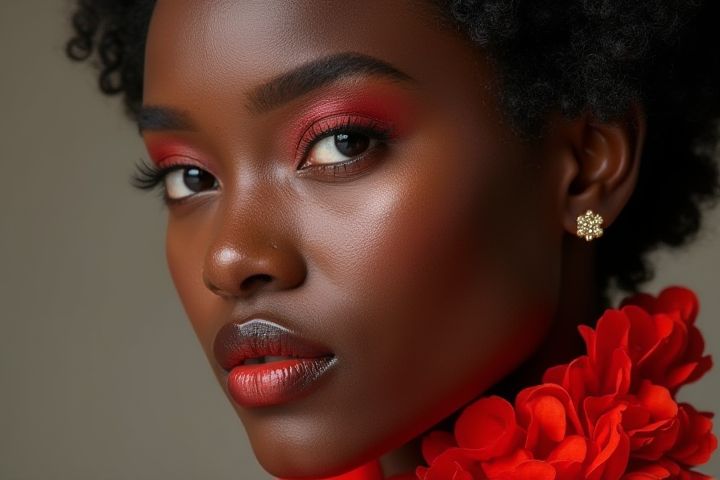
The fashion industry in Nigeria represents a vibrant fusion of traditional craftsmanship and contemporary design, reflecting the country's rich cultural heritage. Designers like Deola Sagoe and Zizi Cardow are renowned for their innovative use of local fabrics, such as Ankara and Aso Oke, which capture both local and international attention. Nigerian fashion weeks, held in cities like Lagos, showcase emerging talents and established brands, creating platforms for networking and global visibility. The rise of e-commerce in Nigeria is transforming the retail landscape, providing consumers with access to diverse fashion options from local designers. As you navigate this dynamic sector, consider the importance of sustainability and ethical practices, which are becoming pivotal in driving consumer choices.
Rich cultural influences
The Nigerian fashion industry is a vibrant tapestry woven from rich cultural influences, reflecting the country's diverse ethnic heritage. Designers draw inspiration from traditional fabrics such as Ankara and Aso Oke, infusing contemporary styles with intricate patterns and bold colors. Fashion events like Arise Fashion Week showcase emerging talents, promoting local craftsmanship and sustainability while attracting global attention. Engaging with these cultural narratives not only celebrates Nigeria's history but also positions the nation as a significant player in the global fashion landscape.
Emerging global designers
The Nigerian fashion industry is rapidly gaining recognition for its innovative and emerging global designers who are redefining traditional aesthetics. Designers such as Duro Olowu and Lisa Folawiyo creatively blend cultural heritage with contemporary styles, producing garments that resonate with both local and international audiences. Fashion weeks in cities like Lagos showcase diverse collections that highlight vibrant textiles and craftsmanship, attracting global attention and investment. Engaging with these emerging talents not only enriches your wardrobe but also supports a burgeoning creative economy in Nigeria.
Ankara fabric popularity
Ankara fabric has become a symbol of Nigerian culture and identity, widely celebrated for its vibrant patterns and versatility. This cotton fabric is commonly used in various styles, from traditional attire to contemporary fashion, appealing to both local and international markets. Prominent Nigerian designers are increasingly incorporating Ankara in runway shows, showcasing its potential for innovation in high fashion. As a consumer, you can embrace this trend by exploring diverse clothing options made from Ankara, which reflect the richness of African heritage while promoting sustainable fashion practices.
Diverse design aesthetics
The Nigerian fashion industry thrives on diverse design aesthetics, showcasing a rich fusion of traditional elements and contemporary influences. Designers often incorporate vibrant fabrics like Ankara, lace, and Adire, reflecting the nation's cultural heritage while appealing to global trends. This vibrant scene is fueled by events such as Lagos Fashion Week, which spotlight both established and emerging talents, promoting innovation and creativity. You can find unique pieces that celebrate individuality and heritage, making Nigerian fashion a dynamic force in the global market.
Growing fashion exports
The Nigerian fashion industry is strategically positioning itself to enhance fashion exports, showcasing unique African designs and craftsmanship. With a blend of traditional techniques and contemporary styles, Nigerian designers are gaining global recognition, contributing to a vibrant cultural exchange. This growth is supported by government initiatives aimed at promoting local brands and increasing international market access. You can explore these emerging trends in Nigerian fashion, which not only elevate the country's economy but also celebrate its rich heritage.
Lagos Fashion Week
Lagos Fashion Week is a pivotal event in the Nigerian fashion industry, showcasing a diverse array of local and international designers. With its emphasis on creativity and innovation, the week promotes Nigeria's cultural heritage while driving economic growth through fashion. Attendees can witness a blend of traditional and contemporary styles, reflecting the vibrant Nigerian fashion scene. This event not only elevates the profiles of emerging designers but also attracts global attention, positioning Lagos as a dynamic fashion hub.
Increasing digital presence
The Nigerian fashion industry is increasingly leveraging digital platforms to showcase local talent and expand its reach globally. E-commerce websites and social media platforms, such as Instagram and Facebook, are pivotal in connecting designers directly with consumers, making fashion more accessible. By engaging with online influencers and utilizing targeted advertising, brands are effectively increasing brand awareness and driving sales. This digital transformation not only empowers homegrown fashion houses but also nurtures a vibrant community of fashion enthusiasts across Nigeria.
Sustainable fashion initiatives
The fashion industry in Nigeria is increasingly embracing sustainable fashion initiatives, reflecting a growing awareness of environmental concerns and ethical practices. Local designers are prioritizing eco-friendly materials, such as organic cotton and recycled fabrics, to reduce the industry's carbon footprint. This shift not only showcases cultural heritage through traditional craftsmanship but also promotes fair trade practices that empower local artisans. By choosing sustainable fashion, you contribute to protecting the environment while supporting the vibrant creative economy of Nigeria.
Local manufacturing growth
The fashion industry in Nigeria is experiencing significant growth, driven by a focus on local manufacturing and sustainable practices. Designers increasingly prioritize the use of indigenous textiles and craftsmanship, showcasing vibrant cultural heritage while boosting the economy. This shift not only empowers local artisans but also attracts international attention to Nigeria's unique style and creativity. By investing in homegrown talent and resources, you can contribute to a more robust and innovative fashion ecosystem.
Celebrity fashion influence
The Nigerian fashion industry has rapidly evolved, significantly influenced by celebrity endorsements and personal styles. Prominent figures such as Genevieve Nnaji and Wizkid frequently shape trends, with their fashion choices showcased at events and on social media platforms. This celebrity fashion influence often leads to the rise of local designers, who gain visibility and success through collaborations or features in music videos and red carpet events. As a result, consumers increasingly seek to emulate the styles of their favorite stars, driving demand for both high-end and accessible fashion in Nigeria.
